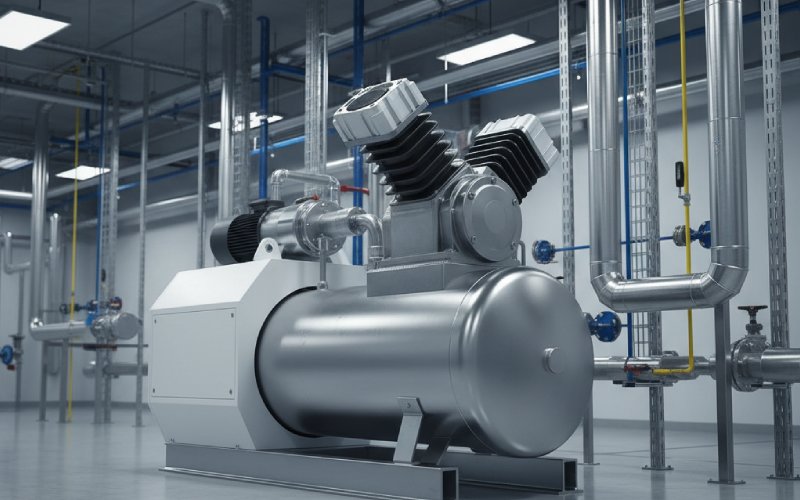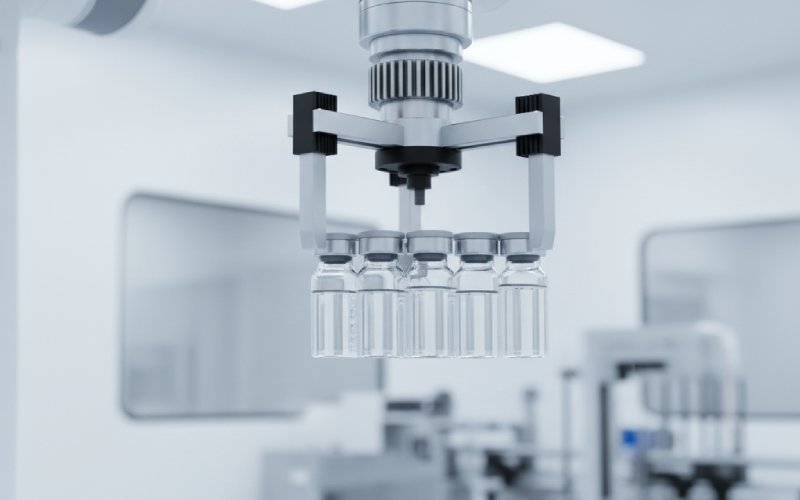Let Sino's Lamination Stacks Empower Your Project!
To speed up your project, you can label Lamination Stacks with details such as tolerance, material, surface finish, whether or not oxidized insulation is required, quantity, and more.

In many places that make things, compressed air is just as needed as electricity. It helps run tools. It helps move items. And it is a part of how things are made. But not all compressed air is the same. Some air compressors use oil in the part that squeezes the air. This can make your air dirty with oil. An oil-free compressor keeps oil out of your compressed air right from the beginning.
This article is for any person in charge of a factory or a business owner who wants to make better products, spend less money, and have fewer problems with machine repairs. You will learn the main good things about using oil-free air compressors. We will show you how this type of machine can keep your products safe, save you money, and make your workplace cleaner and safer.
When we say an oil-free air compressor, we mean that no oil is used inside the part of the machine that squeezes the air. In an older type of machine, an oil-flooded compressor, oil is used to help the parts move smoothly and create a tight seal. This method works, but it means that tiny drops of oil get mixed in with the compressed air. People then use filters to try and take this oil out.
An oil-free compressor is built in a different way. It might use special non-stick coatings, like Teflon. It might also have parts made of materials that do not need oil to move easily. Because no oil ever gets into this part of the machine, the compressed air that comes out is clean. It is free from any extra oil contamination. This is the big difference. One type of compressor tries to clean the oil out later. An oil-free compressor stops the oil from ever getting in at all.
The most important benefit of oil-free compressors is that they stop the chance of oil getting on your product. In an oil-flooded system, you have to count on filters to make the air clean. But what if a filter breaks? What if it is not changed when it should be? If that happens, oil will go through the pipes and into the area where you make your products. This can be a very big problem.
Oil-free compressors get rid of this risk for good. Since there is no oil in the squeezing process, there is no way for it to get into the air. You get pure, clean compressed air all the time. This keeps your product safe, your equipment safe, and your company’s good name safe. You do not have to worry anymore about a broken filter ruining a whole group of your products. Not having to worry is a big reason why many businesses change to an oil-free compressor.
You might think a small bit of oil is not a problem. But in many types of businesses, even a tiny amount of contamination can cause huge trouble. A very small drop of oil can ruin food items, make paint have bubbles, or break delicate electronics. This leads to products you have to throw away, expensive times when you cannot make things, and costly product recalls.
The quality of your product is at risk. Oil contamination can hurt your company’s good name, and it can be hard to get that trust back. Customers expect a perfect product every single time. If your product is ruined by oil, they might stop trusting you. Stopping oil from getting on your products is not just about following rules. It is about protecting the quality of what you make and keeping your business healthy. The chance of having an oil problem is not worth the high cost.
The International Standards Organization, or ISO, made a rule for compressed air quality called ISO 8573-1. This rule gives a score for how clean the air is based on how much dirt, water, and oil is in it. The levels go from Class X (the dirtiest) to Class 1. For a long time, Class 1 was the best and cleanest standard.
Then, some companies made technology that was even cleaner. So, a new level was created: Class 0. Class 0 is the strictest rule for air quality. For an air compressor to be called Class 0, it must provide air that has no oil mist or gas in it at all. A compressor that is certified as Class 0 has been tested. The tests prove that it makes truly clean air. This is not just something a company says to sell machines; it is a promise of pure, high-quality air. This is why Class 0 certified oil-free air is very important for jobs that need things to be perfect.
| ISO 8573-1 Air Quality Class | Solid Bits (size in microns) | Total Oil Amount (mg/m³) |
|---|---|---|
| Class 1 | 20,000 bits of 0.1-0.5 micron size | 0.01 |
| Class 0 | Set by the user or the machine maker; stricter than Class 1. | Set by the user or the machine maker; stricter than Class 1. |
This chart shows that Class 0 is even better than the strict rules of Class 1. A Class 0 oil-free compressor lets you control the air quality to protect your product quality.
In many steps of making a product, the compressed air touches the product or gets very close to it. Any dirt in the air can get onto the product. An oil-free compressor is the best way to keep these careful steps safe. For example, in the food and beverage business, compressed air is used to clean, cut, and move food. Any oil in the air could end up in the food. That could cause a big food safety problem.
In the business of making medicine, an oil-free compressor is very needed. Compressed air is used for tablet coating, cleaning bottles, and moving delicate powders. Oil contamination could spoil a whole lot of medicine. In making electronics, compressed air is used to clean tiny circuit boards. Even a very small bit of oil can make a part stop working. For making clothes, oil in the air from air-jet looms or spinning machines can stain the cloth, making it so you cannot sell it. Using an oil-free compressor keeps these very important steps in the making of a product safe.

Any business can get good results from cleaner air, but some businesses must have the purest air possible. For these businesses, using an oil-free air compressor is not a choice—it is something they must have. The best choice for these businesses is always the cleanest air.
Here are some of the businesses that get the most help from this technology:
In any job where air quality is very important, an oil-free compressor is the perfect choice.
Yes, they do. Oil-free compressors need fewer repairs in a few ways. An oil-flooded compressor has more parts that need to be checked and fixed. You have to do an oil change, put in new oil separator filters, and take care of the oily water. All of this costs time and money. These machines need more maintenance.
With an oil-free compressor, you do not have to do these jobs. There is no oil to change. There are no costly oil separator filters to buy and change every six to twelve months. This means you spend less money on repairs and the machine is working more of the time. The first price of an oil-free compressor can be higher. But the money you save on repairs and parts can make it a better choice for your money over the life of the machine. Fewer parts mean fewer problems and a lower total cost to own it.
The price you see at first for an oil-flooded compressor might be lower, but there are many costs you don’t see right away. First is the cost of new filters. These filters can cost you a lot of money each year. Second is the cost of power. It takes more energy to push compressed air through many filters. This makes you pay more for electricity. An oil-free machine can be built to use less energy.
Another big cost is dealing with the oily water, or condensate. The water that comes out of the compressed air in an oil-flooded system is mixed with oil. You cannot just put this down a normal drain. It is seen as dangerous trash. It must be collected and thrown away in the right, safe way, which costs money. The biggest hidden cost, though, is the risk of getting oil on your product. One single time this happens can cost you thousands or even millions of dollars. You lose money from the bad product, from recalls, and from hurting your company’s name. These costs are much bigger than the money you save at the start on an oil-flooded compressor.
Using an oil-free compressor is better for the earth. The clearest good thing is that you do not have to deal with oily condensate. In an oil-flooded compressor, the water that comes out of the system is dirty with oil. This mix must be carefully collected. Then it has to be sent to a special place to be thrown away. This can be costly and is a danger to nature if it is not done right.
With an oil-free compressor, the condensate is just water. It is clean. You can often put it right into a normal drain. This saves you time and money. This helps your workplace use less oil and be kinder to the world. By picking an oil-free compressor, you are making a better choice for your plant and for everyone. You get rid of the need to handle and throw away dangerous oily waste.

To figure out if an oil-free compressor is right for you, ask yourself some questions. How important is the quality of your product to your business? How much money would a product recall cost you because of oil contamination? Are you in a business with very strict rules about being clean, like making food or medicine?
If your product touches compressed air, or if your company’s good name rests on perfect quality, then the answer is probably yes. An oil-free compressor is a way to spend money now to get something good and that you can count on. It lowers the chance of contamination to zero. The first price might be higher. But the long-term savings on repairs, energy, and preventing risks often make it the best way to spend your money in the long run. Keeping your product and your mind safe is a benefit that is very valuable.